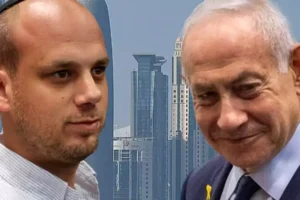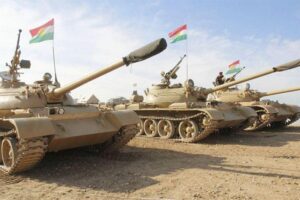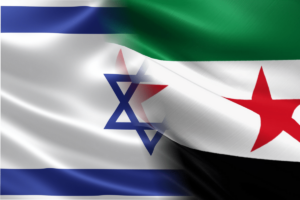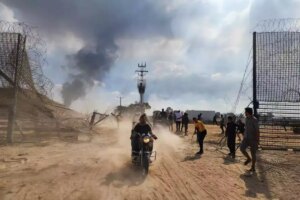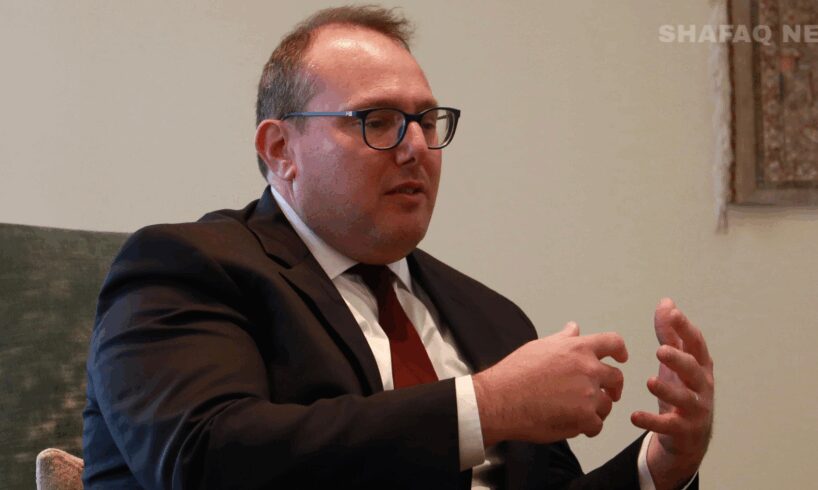
Shafaq News – Baghdad
The United States Chargé d’Affaires in
Baghdad, Joshua Harris, said Iraq remains central to Washington’s strategy in
the Middle East, outlining priorities in security, sovereignty, economic
development, and political stability.
In an exclusive interview with Shafaq News,
Harris stressed that the Trump administration’s “America First” policy is being
applied in a way that also seeks to build a balanced partnership with Baghdad.
Hostage Release and “Peace through Strength”
Harris opened by addressing the release of
Elizabeth Tsurkov, an Israeli-Russian researcher kidnapped in Baghdad in 2023.
He praised Prime Minister Mohammed Shia al-Sudani’s role in securing her
freedom.
He described Tsurkov’s abduction as “a crime
and a violation of Iraqi law,” stressing that Washington had been assured by
Iraqi officials that her release involved “no money and no deals.”
“It’s wonderful that she has been released
and reunited with her family,” Harris said, adding that the kidnapping of a US
resident violated Iraqi law and that “there needs to be accountability for this
crime.”
He underscored President Donald Trump’s
position that “hostages need to be released, full stop,” calling the outcome an
example of “peace through strength.”
Tsurkov, accused by her kidnappers of spying
for Israel, was abducted in Baghdad’s Karrada district in March 2023. A video
later showed her speaking in Hebrew under duress. Her captivity lasted more
than 900 days before she was freed in September 2025.
“This crime never should have happened in the
first place, and Iraq’s laws should be upheld in this regard,” Harris added.
Iraq’s Place in US Foreign Policy
Harris rejected suggestions that Iraq has
slipped to the margins of US policy. “The United States under President Trump’s
leadership is going to put American interests first. That is true of our
relationship here, and it’s true for what we’re doing around the world,” he
said, highlighting the work of a “wonderful team of professionals” at the US
mission in Baghdad, tasked with ensuring America is “safer, stronger, and more
prosperous” through “a relationship and partnership between the United States
and Iraq that meets the needs of Iraq, but meets the needs of the United
States, as well. That’s what we’re here to do.”
According to Harris, Washington’s vision is
to support Iraq in becoming “fully sovereign, secure within its borders, and
able to contribute to regional stability,” while advancing prosperity through
economic growth. “And then Iraq is prosperous, it’s able to move forward in our
economic relationship in a way that has real benefits, benefits of course for
the people of Iraq and for the American people, as well.”
Since 2003, US policy toward Iraq has shifted
under successive administrations. The Bush administration oversaw the invasion,
Obama ordered a full withdrawal in 2011, Biden limited the role to training in
2021, and Trump is now pursuing a partnership rooted in sovereignty and
security.
Security Partnership After Global Coalition
Withdrawal
With the Global Coalition’s combat forces
departing Iraq, Harris described the US–Iraqi security partnership as entering
a “new chapter.” He said both countries remain committed to ensuring terrorism
is “sustainably defeated” and praised Iraq’s role as a founding member of the
coalition against ISIS.
“The Iraq of 2025 is a very different place,”
Harris noted. “We need together to make sure terrorism is sustainably defeated.
This is absolutely in the interest of the United States, and I know it is in
the interest of Iraq, as well.”
He confirmed that discussions are underway on
the “next chapter” of cooperation, stressing that any arrangement must meet the
needs of both sides.
“We are implementing an agreed-upon
transition plan that will allow this partnership to move forward to respond to
the current challenges of the world that we face together. Iraq is a founding
member of the global coalition to defeat Daesh, along with the United States,
and we are maturing our relationship together to make sure that we have the
posture and the partnership and the tools that we need to make sure that
terrorism in this region is sustainably defeated. Very significant progress has
been made in this regard.”
Harris declined to say whether Baghdad had
formally requested US forces to remain, saying that was for the Iraqi
government to state publicly.
PMF Law and Iranian-backed Groups
On the postponed draft law concerning the
Popular Mobilization Forces (PMF), Harris avoided speculation about legislative
outcomes but reiterated US concerns about Iran’s influence.
“One of Iraq’s neighbors [Iran] is continuing
to disregard Iraqi sovereignty and, through proxy groups, drag Iraq in a
dangerous direction,” he said. “The presence of Iranian-backed militia groups
is a liability for Iraq’s own sovereignty, and they are a liability for an
effective and strong US partnership with Iraq.”
“We will continue to speak very clearly about
our concerns, the presence of Iranian-backed militia, terrorist groups that are
operating in this country outside the command and control of Iraq’s
government,” he pointed out, adding, “It should not be controversial that all
security actors within Iraq would operate under the command and control of
Iraq’s elected government.”
He noted that Washington had recently
designated four Iraqi groups “that are directed and controlled by Iran,” as
foreign terrorist organizations, for threatening the United States.
Kurdistan Region Relations and Oil Exports
Harris also addressed disputes between
Baghdad and Erbil, including salary delays and oil exports, confirming that
Washington is facilitating talks to reopen the Iraq–Turkiye pipeline.
“Progress in this regard would be very
significant for US companies operating here,” he said, adding that it would
also send a positive signal to investors.
During a recent visit to Erbil, Harris met
Prime Minister Masrour Barzani and other officials to discuss what he described
as a “very special partnership” between the US and the Kurdistan Region.
On unrest in Al-Sulaymaniyah following the
arrest of former PUK co-leader Lahur Sheikh Jangi under counterterrorism
charges, Harris said Kurdish officials are best positioned to speak about their
own political situation. “They know their political situation; they are best
positioned to speak to issues like this. We are going to continue to talk to
our partners in the Kurdistan Regional Government about what matters for the
United States and our shared priorities.”
“Violence anywhere in this country is very
troubling and concerning,” he added. “We very much want to see a strong
Iraqi-Kurdistan region, a strong Iraq that is able to partner with the United
States to advance our shared priorities.”
Elections and Political Participation
On the parliamentary elections scheduled for
November 2025, Harris said decisions about participation, including by Muqtada
al-Sadr’s movement, are for Iraqis to make.
“The Iraqi people need to speak to their
expectations about their political future,” he said. For Washington, the
partnership with Iraq is “a very special partnership that has to meet our
mutual needs. That’s true now; it will be true after the elections. We’re going
to continue to talk about what’s – what we need to see to make a strong
partnership possible.”
Israeli Strikes and Regional Tensions
Addressing allegations that Israel may launch
attacks inside Iraq, Harris said he heard “very clearly” from Iraqi officials
that they want to avoid being drawn into regional conflict, praising Prime
Minister al-Sudani’s role in keeping Iraq out of the June 2025 12-day war
between Israel and Iran.
“For Iraq to avoid entanglement,” Harris
said, “there are actions that could be taken now and in the future,”
particularly addressing “militia terrorist groups supported by Iran.”
“I’m not going to speculate about the future,
but I will say that for Iraq to stay out of conflict, I believe that our Iraqi
partners know very well there are actions that could be taken on the part of
the Iraqi Government now and in the future that would make it more or less
likely that Iraq would find itself in conflict. So I think it’s very important
to our conversations to make sure that we’re prioritizing and seeing Iraq
prioritize those actions that are going to keep Iraq out of conflict within
this region … that means to address the very serious challenge of those militia
terrorist groups that are supported by Iran that are working against Iraqi
sovereignty and against a strong partnership with the United States. And we’ll
continue to have exactly that conversation. Our Iraqi partners, I think,
understand very clearly what is necessary within this period.”
Freedom of Press
Asked about freedom of expression, Harris
said he valued the opportunity to engage with Iraqi media. “This is a very
healthy and positive exercise,” he noted, stressing that dialogue helps explain
US priorities and builds transparency in the relationship.
In closing, Harris said Iraq and the United
States face “a very significant moment” in which risks are high but
opportunities remain for a stronger partnership. “We want to see an Iraq that
can build a future that is sovereign and secure and prosperous, exactly as what
I’ve heard Iraqis expect,” he said.
Harris said that shared priorities between
Iraq, including the Kurdistan Region, and the US is “making sure that Iraq’s
sovereignty is defended, making sure that this country is secure within its
borders and able to export security to the region, making sure that we’re doing
everything possible to advance prosperity for our people, to deliver for Iraqis
and Americans alike.”
Written and edited by Shafaq News staff.
